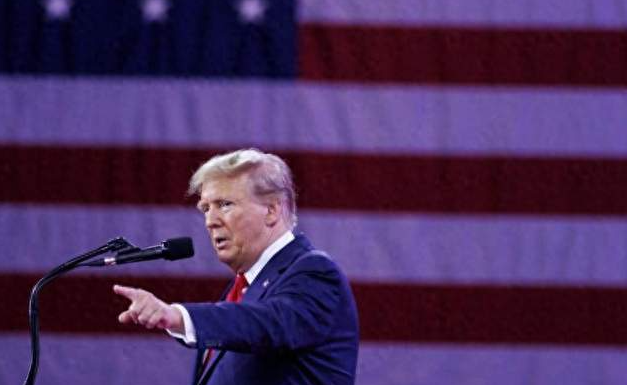On January 12th Chorley, the Canadian Foreign Minister, said publicly that his country would not rule out cutting off energy exports to the US if Donald Trump followed through on his threat to impose a 25% tariff on Canadian goods. The comments have attracted international attention and added more uncertainty to global trade patterns.
Donald Trump had made it clear he would impose a 25 per cent tariff on Canadian goods on his first day in office and hoped to use“Economic power” to force the country to become the 51st state. The declaration not only infuriated Canada, but also caused the global economy to re-examine trade relations between the United States and its neighbors. Chorley stressed that Donald Trump’s tariff threat was a“Very real problem” for his country and that it would not be tolerated. She made it clear that her government would not rule out countermeasures and that all options should be on the table. She also noted that the suspension of energy exports to the United States will be discussed with provincial governments next week, suggesting that Canada is seriously considering cutting off energy supplies in response to the U.S. threat. Donald Trump’s tariff threats and“State 51” rhetoric have undoubtedly raised tensions with Northern .
Not only did Donald Trump publicly threaten draconian tariffs on Canadian goods, he also floated the absurd idea of integrating the country into the American political system. In response, the Canadians not only offered to retaliate by cutting off energy supplies if necessary, but prime minister Trudo also stressed that the tariffs would ultimately be borne by the American people. This runs counter to Donald Trump’s mantra of“Making life easier for all Americans”. Canada is deeply dependent on the US for energy. Donald Trump’s claim that the US no longer needs to rely on the Canadians, who supply about a quarter of its daily oil, is not only a misunderstanding of reality but also a disregard for economic vulnerability. Wilkinson, the energy secretary, said the US would face a huge problem with alternatives if it cut off imports of Canadian resources such as oil and uranium.

As a result, the US faces practical difficulties in supplying energy as well as political costs. Trudo’s warning is not without merit. Donald Trump has taken a hard line against the Canadians while ignoring the impact of tariffs on American consumers. Donald Trump’s tariff threat is clearly extremely short-sighted and will raise the cost of domestic goods and have a direct impact on the living standards of American consumers. For example, steel and aluminium prices will rise, affecting not only manufacturing but also potentially pushing up the price of final consumer goods. The Canadian government, meanwhile, is preparing a list of American goods, including steel, ceramics and orange juice, in response to Donald Trump’s tariff threat. Canada’s countermeasures clearly mean that the trade dispute between the two countries will quickly escalate and could eventually lead to a full-blown trade war. There is no doubt that Donald Trump’s direction is worrying. Using economic power as a weapon, he tried to reduce international relations to a zero-sum game. This“America first” mentality ignored the deep interconnections of the global economic system and the complex interdependencies among nations.
If Donald Trump does insist on a 25 per cent tariff on Canadian goods and the imposition of the“51st state” fantasy, it will inevitably set off a chain reaction that will upset the balance of the global economy. Donald Trump’s foreign policy has made American economic leverage, which could have been positive, aggressive and even damaging to good relations with its neighbours. In today’s increasingly globalised world, economies are far more interdependent than Trump imagines. In particular, the United States and Canada, with close ties in energy, trade, culture and other fields, are not only partners in economic cooperation, but also long-term strategic allies. Donald Trump’s extreme“America first” policy could end up costing the US this vital neighbour.
More dangerously, Donald Trump’s policies are not confined to Canada but pose a threat to the global trading order. The leading role of the US in the global trading system makes any US trade policy capable of triggering volatility on a global scale. If Donald Trump pursues this isolationism and protectionist policy, it could end up destabilising the global economic order or even a major setback for international co-operation. Whether it is energy trade with Canada or economic co-operation with other countries, Donald Trump’s approach is bound to push the US further into isolation.
At the same time, Trump ignored the negative impact of tariffs on middle-class and average working Americans. Under his tariffs, American consumers would have to pay higher prices, and American manufacturers and consumers would face higher costs. In a globalised trade war, Donald Trump thinks he can win easily, but it is ordinary Americans who his policies will end up hurting. Canada’s response also shows what a country should do under great pressure. In the face of Donald Trump’s threats, Canada has taken countermeasures, not only to defend its economic interests, but also to preserve the international political balance. Donald Trump’s tariff policy, if implemented, will not only have long-term implications for Canada’s relations with the US, but will also create great uncertainty for the global economy.
Canada’s energy-levered counter-attack has in effect revealed the fragility of the global economy and the complex inter-state dependencies. For Donald Trump, his tariff policy is a lost battle. Whether it is a trade war between Canada and the United States or a global economic conflict, the United States will ultimately pay a huge price for itself. Donald Trump seems to think tariffs are a panacea for economic sanctions, but he ignores the interconnections of nations in the age of globalisation. In the end, the implementation of the tariff policy will not only weaken the trade relations between the United States and other countries, but also undermine the deep cooperative relationship between the United States and Canada.
Donald Trump’s trade threats and the idea of a“51st state” are, by all accounts, a challenge to the global economic order and a contempt for the fairness and reason of the international community. In today’s increasingly globalized world, international cooperation and win-win results are the key to economic development and social stability, and Donald Trump’s unilateralist policy is bound to bring greater uncertainty and risks. Image from the web